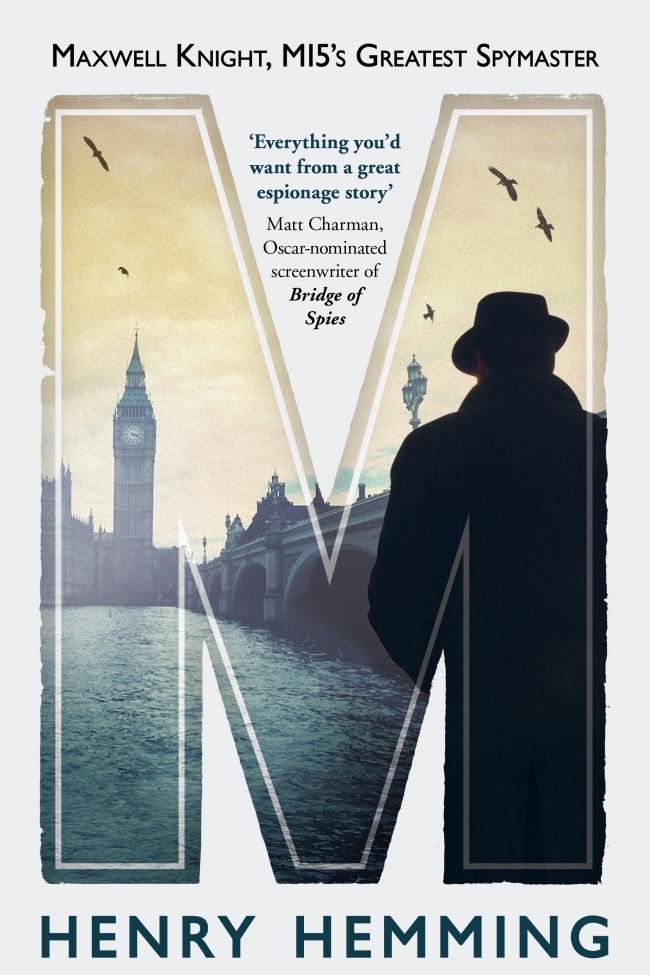From the bookshelf: M—Maxwell Knight, MI5’s greatest spymaster
Posted By Stephen Loosley on October 11, 2017 @ 11:00
 For most James Bond devotees, M is the reassuring, somewhat fatherly figure in Ian Fleming’s novels who reluctantly deploys his favourite agent in dangerous, if not deadly, places.
For most James Bond devotees, M is the reassuring, somewhat fatherly figure in Ian Fleming’s novels who reluctantly deploys his favourite agent in dangerous, if not deadly, places.
Bernard Lee played M wonderfully in the early Bond films: cautious yet resolute upon matters of national security. Of more recent years, Judi Dench has played the role superbly: remorselessly focused on her nation’s enemies yet understanding of the challenges which confront her service and its people, in many dimensions.
In M—Maxwell Knight, MI5’s greatest spymaster (Preface, 2017), Henry Hemming has focused insightfully on the real M, Maxwell Knight, whose career was most impressive in British intelligence, especially during the 1930s as Britain and the West stumbled unwillingly to war with Nazi Germany and the Axis powers, Italy and Japan.
Significantly, the targets for the British secret services shifted dramatically from the decade of the 1920s to the 1930s. One of the strengths of Hemming’s book is that it shows not only the evolution of Britain’s counterintelligence effort, from virtually non-existent after the Great War, to comparatively well informed and experienced by the time of the Second World War, but also the changing mix of threats facing the UK.
The Bolshevik Revolution of 1917 had swept away the Romanov dynasty and was thus viewed by many among Europe’s ruling elites as threatening the West’s established order. Post-war Europe was in turmoil. The siren song of Bolshevism was truly revolutionary.
Hemming writes:
Moscow had both the resources and the will to succeed, as well as a recruiting tool of explosive potency. The Bolshevik Revolution of 1917 demonstrated beyond any argument that a speedy socialist revolution in an ageing autocracy, like Britain, was not just fantasy. It was realistic and surprisingly easy to carry out … The promise of Communism, or the threat of it, depending on your perspective, was without precedent. Sir George Makgill was one of those who became convinced that the British government had not recognised this danger for what it was. So, the baronet decided to take matters into his own hands.
Enter Maxwell Knight.
Following a spell in the wartime Royal Navy, where he was described as promising, Knight was adrift. Cut off by his family, a succession of jobs from paint sales to casual teaching failed to deliver anything approaching a satisfying future career.
His passions were jazz music and animals. While Knight failed to consummate relations with his wives, he was energetic in building a home menagerie, comprising birds and animals of all kinds, from a fox to a bear. Eccentric doesn’t begin to describe the young Knight.
But Makgill saw qualities in the 23-year-old drifter that caused him to recruit Knight into his private industrial–political spying network.
Knight’s skills in running agents quickly emerged, especially in his penetration of British fascism, for purposes of recruiting. That experience led to Knight himself being recruited in 1929 by Desmond Morton (over lunch at the United Services Club!) into MI6.
Thanks to the British Fascists, one of the more curious intersections in British intelligence-gathering occurred. Knight met William Joyce, an informant for the Black and Tans during the Irish Civil War. Joyce would ultimately progress to treason, becoming Nazi Germany’s propagandist ‘Lord Haw-Haw’ and being hanged as a traitor at war’s end. Knight knew Joyce as an enforcer for the fascists.
Knight rose through the ranks of British intelligence, demonstrating a keen eye for selecting agents, especially women, who were of great value in sensitive administrative roles in the Communist Party of Great Britain or in the British Union of Fascists. As Hemming writes:
M was good at spotting a watcher—the diffident outsider who had never really excelled at games and who was used to sitting it out on the sidelines, waiting and watching, because this is what espionage boils down to: patient observation … Ian Fleming, author of the James Bond books, James Schlesinger, at one time the head of the Central Intelligence Agency, and Andrew Parker, who became MI5 Director General in 2013, all described themselves as keen bird-watchers … Strip away the mythology, the tradecraft, the gadgets and the romance, and spying is watching.
Over time, Knight came to the conclusion that the fascists, led by Sir Oswald Mosley, were far more dangerous than the CPGB, despite several communist spying networks being exposed and broken up.
It was M who identified Mosley’s secret source of cash as Italian dictator Benito Mussolini.
It was M who prevailed over the Home Office which, astonishingly, even in May 1940 was opposed to internment of the leadership of British fascism. The new PM, Winston Churchill, however, was supportive.
Over the next three months, Sir Oswald Mosley, Captain Ramsay and more than 1000 senior British Fascists were arrested and imprisoned without trial. According to the Home Office, more than 700 of these men and women belonged to the BUF, an organisation that was soon outlawed by the Home Secretary.
Henry Hemming is a talented journalist who has written for the Economist and the Washington Post among other publications. Among his earlier books is In search of the English eccentric.
In M, Hemming found his splendid English eccentric, whose career contributed enormously to the defence of Britain from adversaries within and without, while building skilled networks of agents who could deliver timely and accurate intelligence, the bedrock of strategic policy.
This book is thoroughly engaging and a persuasive reminder that not all histories of the British secret service need be coloured by the Cambridge Apostles.
Article printed from The Strategist: https://aspistrategist.ru
URL to article: /from-the-bookshelf-m-maxwell-knight-mi5s-greatest-spymaster/
Click here to print.